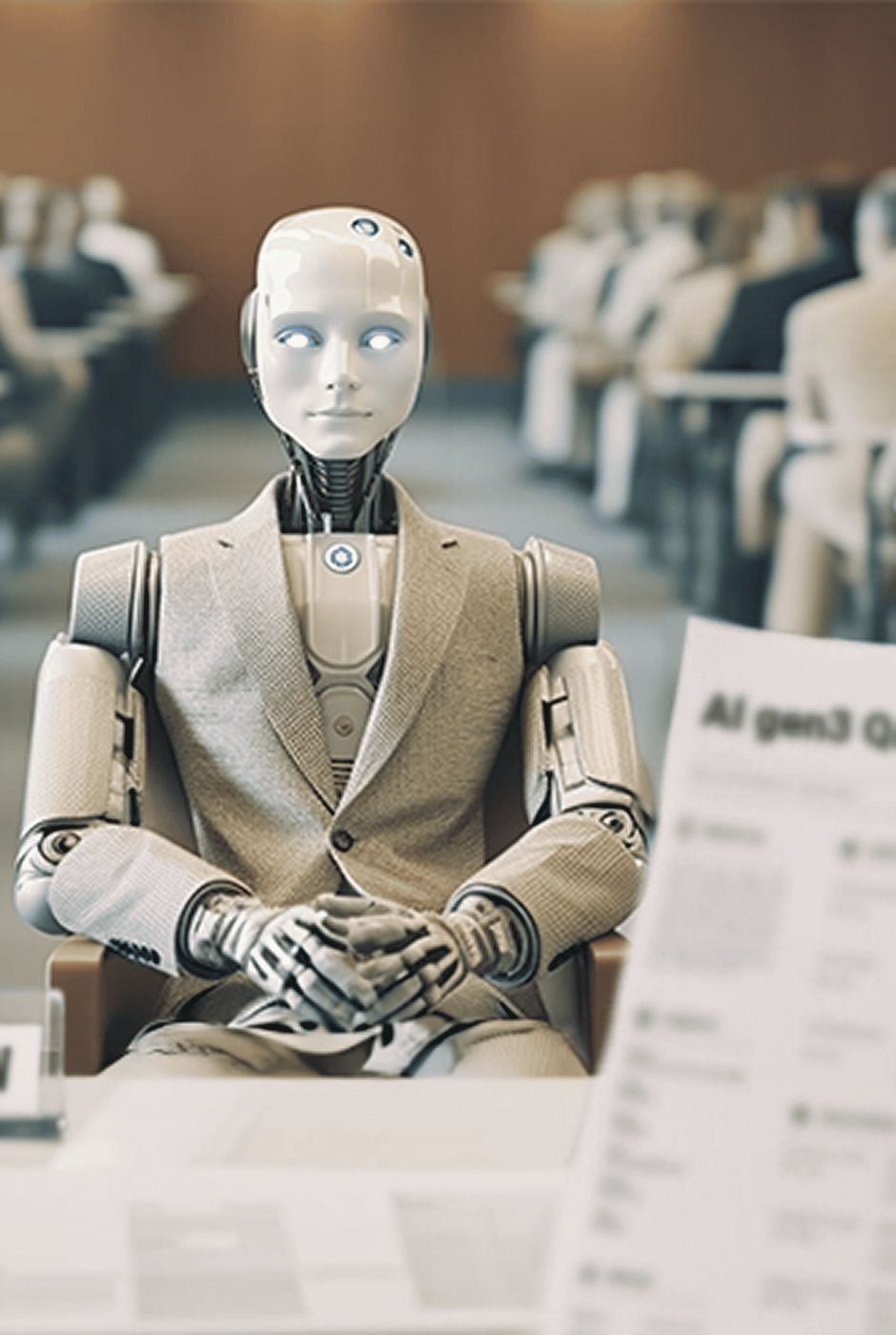The question of whether artificial intelligence will replace data scientists has been coming up more often as new tools reshape the field. AutoML platforms and large language models can already generate code, select models, and analyze datasets faster than people ever could. According to the Gartner Hype Cycle for Artificial Intelligence (2025), these technologies have already passed the Peak of Inflated Expectations and are moving into the Trough of Disillusionment — the stage where businesses begin to see the gap between early promises and what AI can realistically deliver.
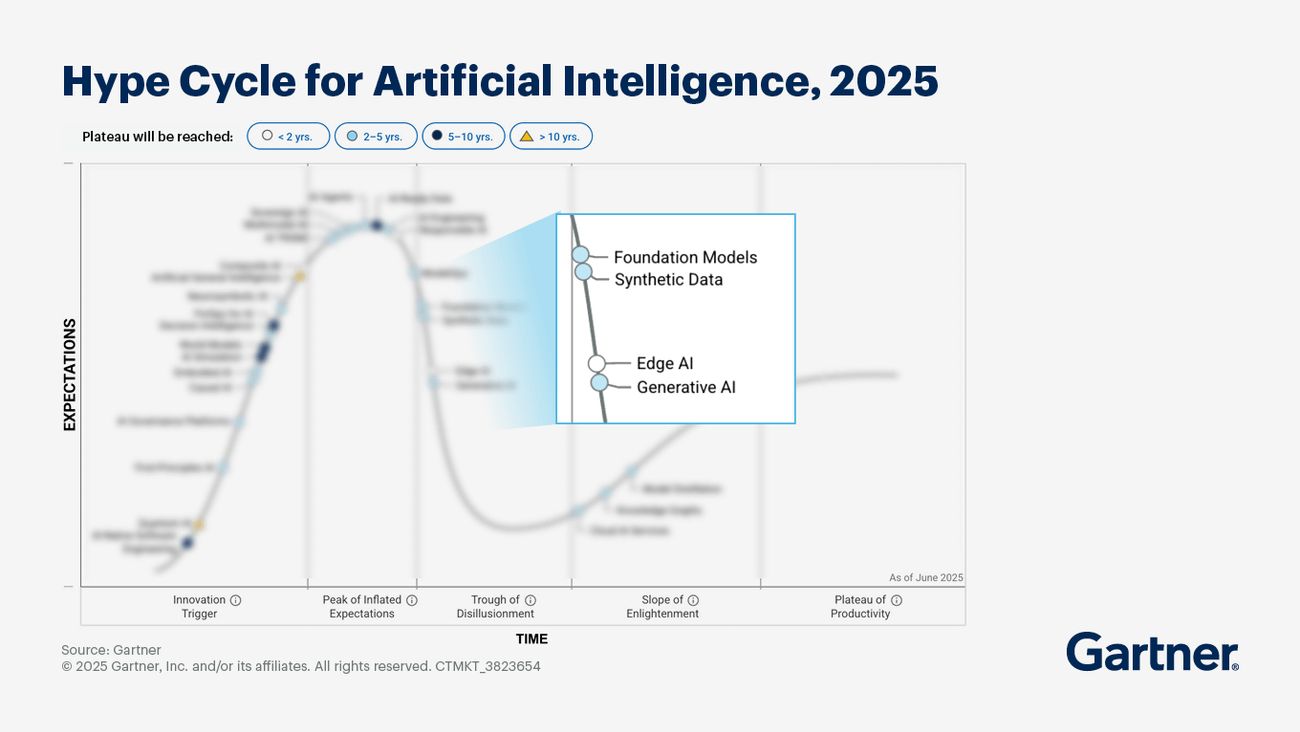
This gap hasn’t stopped some companies from making bold moves. There are CEOs who have laid off staff, convinced that AI can take over entire processes: “AI doesn’t go on strike. It doesn’t ask for a pay raise,” one of them said after replacing workers with AI tools. Others, like TCS, leaned heavily on AI to optimize operations but later faced setbacks and had to retrain or rehire employees when the tools didn’t perform as expected.
These examples show why the debate hasn’t gone away. If AI could truly replace data teams, the conversation would already be over. Instead, companies are realizing that while AI is powerful, it still can’t understand business context, weigh trade‑offs, or ensure results match real goals. That’s why the role of the data scientist isn’t disappearing — it’s evolving. Businesses that want AI to create real value still need people who can guide these tools, interpret their outputs, and make decisions that move the company forward.
Starting with the basics: Will AI take over data analytics? How data science project work
First, let’s break down how AI and data science come together today — in clear, logical stages. This will help business decision-makers understand where data scientists fit in, and when AI integration begins.
Stage 1: Problem definition and data strategy
Everything starts with defining the business problem by predicting churn, improving pricing, or optimizing operations. Data scientists scope the goal, metrics, and success criteria and assess what data exists and how reliable it is.
As Andrew Ng, one of the leading AI pioneers, explains:
“I don’t think AI will replace people, but people that know how to use AI will replace people that don’t”. At this stage, the expertise to ask the right questions and define the right goals still lies entirely with humans.
Stage 2: Data collection and preparation
Once the goal is clear, the team collects and cleans the data by merging sources, fixing errors, and preparing it for modeling. Poor data quality is still one of the biggest reasons AI projects fail, which is why this step requires careful human oversight.
Meta’s chief AI scientist Yann LeCun emphasizes that
“AI lacks human common sense and reasoning” — a reminder that only people can understand what data really matters in a business context.
Stage 3: Exploratory data analysis (EDA) and feature engineering
Data scientists explore the data, visualize patterns, and identify which features may be useful for modeling. AI tools can now speed this up by suggesting correlations or generating features, but deciding which of those actually make sense for the problem still depends on human judgment.
As one experienced data scientist put it after a year of using generative AI: “AI could generate an answer, but it couldn’t tell me if it was the right answer”.
Stage 4: Model building
Here, AI starts to play a bigger role. AutoML platforms can train and test multiple models, tune parameters, and compare results far faster than manual work. Still, humans decide which algorithms to use, which trade‑offs to make, and how to align models with business priorities.
Even at companies leading AI innovation, the approach is collaborative. Mark Zuckerberg predicted that Meta could develop an AI capable of acting as “a sort of mid‑level engineer” — useful for routine tasks, but still working under human direction .
Stage 5: Evaluation, validation, and governance
Once models are trained, they need to be checked for accuracy, fairness, and real‑world usefulness. AI can generate metrics, but interpreting them and deciding if a model is ready for production is still a human responsibility.
Andrew Ng has highlighted that “the hardest parts of data science have little to do with coding and much to do with defining problems and implementing solutions in the real world” — this stage is a perfect example.
Stage 6: Deployment and monitoring
Modern MLOps tools automate deployment and monitor for issues like model drift. Data scientists and engineers, however, configure the environments, respond to anomalies, and retrain models when needed.
Stage 7: Continuous improvement
Once models are live, they need to be improved based on feedback and new data. Data scientists lead this process, deciding when to update models or change strategies.
Keeping up with the topic: Will data scientists be replaced by AI? Technical skill of implementing AI
AI can automate parts of the data science workflow, but without skilled people, it often produces irrelevant or even harmful results. Data scientists make sure AI solutions solve the right problems, use the right data, and deliver outcomes that businesses can trust.
What data scientists actually do
Their work spans the full AI project lifecycle, and every stage has a specific purpose:
Translate business goals into measurable problems. They speak both the language of executives and engineers, framing vague goals like “improve retention” into metrics that AI can optimize.
Collect, clean, and structure data. Most company data is messy, incomplete, or siloed. Data scientists know how to combine and prepare it so that models can actually use it.
Explore data and design meaningful features. AI tools can suggest correlations, but humans decide which ones make sense for the business context.
Choose and build models. They decide which algorithms fit the problem and tune them for accuracy, fairness, and scalability.
Validate and monitor models. Data scientists ensure the results are trustworthy and compliant, which is crucial under regulations like GDPR or the upcoming EU AI Act.
Iterate and improve over time. After deployment, they review how models perform in the real world and update them as conditions change.
This mix of technical skill and business understanding is what allows AI solutions to deliver real results instead of just outputting numbers. As McKinsey puts it, “AI can evolve from a productivity enhancer into a transformative superpower — an effective partner that increases human agency.”
Typical qualifications and experience
To handle this kind of work, data scientists need a broad mix of education, technical expertise, and domain knowledge:
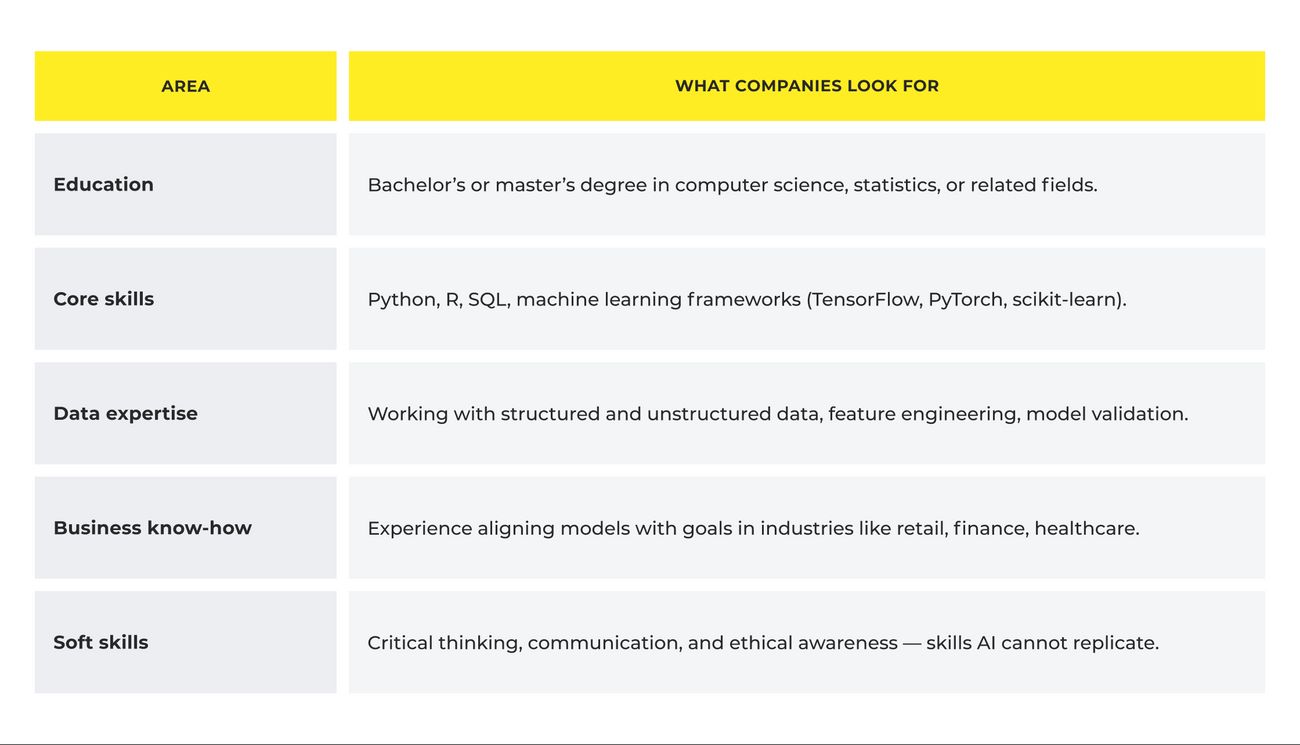
Hiring these specialists isn’t just about coding ability. According to new research by Boston Consulting Group, “Even with the widespread implementation of AI programs across industries, only 26% of companies have developed the necessary set of capabilities to move beyond proofs of concept and generate tangible value”. One of the reasons for their win is their focus They on people and processes over technology and algorithms.
Projects data scientists work on — and why it matters
The work data scientists do directly affects a company’s ability to turn AI into ROI. Below are some examples of typical projects and their outcomes:
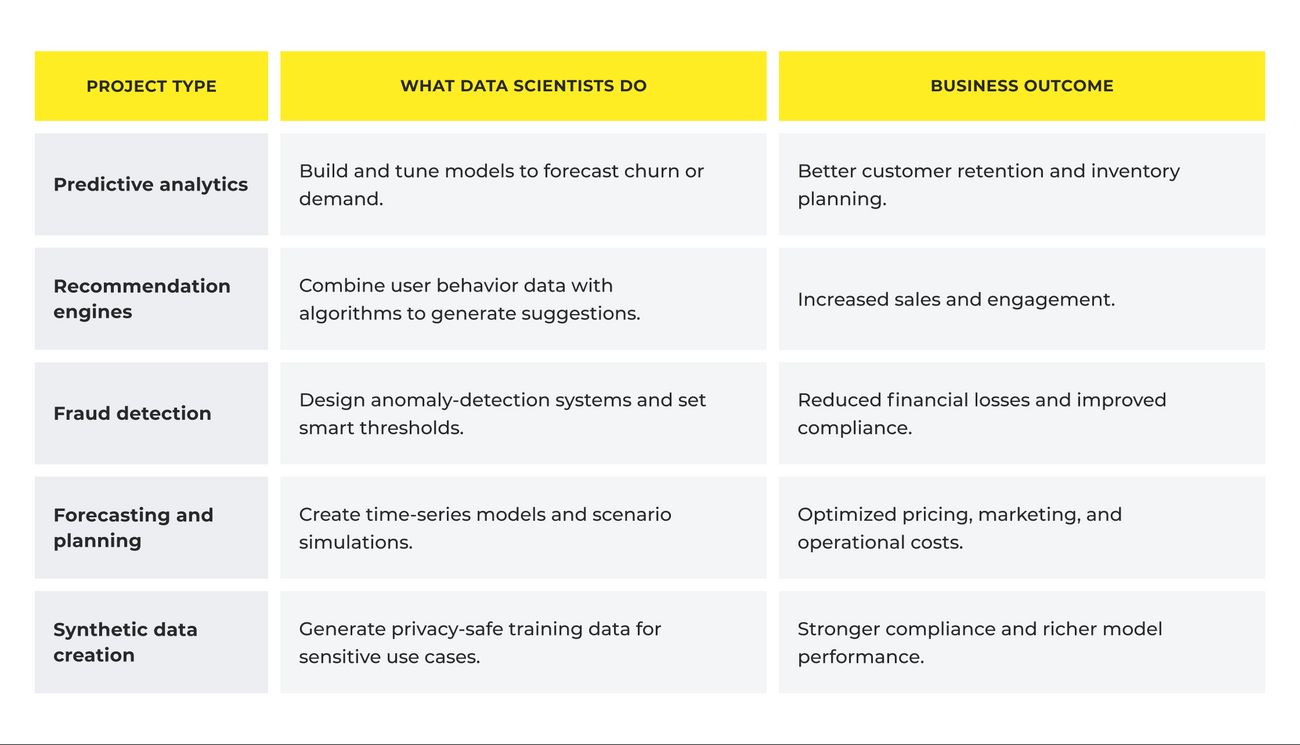
These projects aren’t something AI can just handle on its own. They need experts who understand how to adapt solutions to the business, validate outcomes, and make sure the models keep delivering value over time.
Why their role is critical for businesses
AI can build models, but it can’t decide what problems matter or how to solve them responsibly. Andrew Ng has highlighted that the hardest parts of data science “have little to do with coding and much to do with defining problems and implementing solutions in the real world.”
Companies that have tried to cut data teams and rely only on AI often end up backtracking when results fall short. During the big tech layoffs of 2023, only about 3-5% of affected staff at Amazon and Meta were data scientists — a sign of how valuable these roles remain.
For any business planning to adopt AI, having experienced data scientists is not optional. They ensure that AI solutions are relevant, reliable, and aligned with company goals — turning AI into a real competitive advantage instead of an expensive experiment.
Getting to the answer: Will AI take over data data science? What the industry thinks
The short answer answer from the industry is no — and here's why business leaders shouldn't rely on hype.
AI isn’t a replacement
A recent Microsoft Research study that analyzed over 200,000 Bing Copilot interactions flagged data scientists as one of the most exposed professions to AI automation — but it did not predict their disappearance. Rather, it suggested a “demotion in prestige,” warning that professionals will need to adapt to stay relevant in the evolving landscape.
Meanwhile, conversations in consulting circles — such as among McKinsey insiders — signal that AI failures will create opportunities for professionals to step in and correct misguided implementations. As one of the insiders put it in one of the Reddit conversations: “I foresee significant opportunities for consultants to step in and help organizations recover from failed AI implementations and misguided strategies.”
Experts see collaboration, not replacement
Even powerful institutions like McKinsey stress that AI won’t replace people—but will reshape how they work. A senior partner from McKinsey’s QuantumBlack, Ben Ellencweig, said: “It’s going to be most of what we do in the future,” referring not only to AI tasks, but the strategic leadership around them.
From another angle, Jonathan Roomer, writing about consulting’s future, pointed out that while AI can automate false fronts, the core human-driven work — data collection and sourcing — remains irreplaceable. He concluded: “The best consultants won’t vanish — they’ll pivot to the one part AI can’t replace (yet): data production & collection.”
Academia: A human‑AI team is key
Academic research supports this idea of partnership. A 2019 study on AutoAI automation found that data scientists expected automation but remained confident in their job security, viewing AI as a collaborator rather than a rival. They described the future of data science as one of “human‑AI collaboration”, where machine-generated models still depend on human oversight.
Why data teams aren’t going anywhere
Businesses overwhelmingly confirm that human expertise still matters in AI success:
A McKinsey report revealed that 78% of companies now use AI in at least one function — but typical benefits were modest (under 10% cost savings or 5% revenue gains). Organizations that rely too much on AI without human direction struggle to harness its potential.
A McKinsey senior data scientist, working on life sciences, shared how AI accelerates work but stressed that human co-creation with clients, setting guardrails, and embedding ethical checks are what truly make a difference.
There’s no contradiction here: the role of data scientists is evolving, not vanishing. The smartest organizations are building AI-augmented teams led by human experts. As it was observed: current systems may generate models quickly, but only humans decide if “it was the right answer.” AI doesn’t replace the need to think critically, evaluate trade-offs, or align with strategy. In other words, AI can help — but only if data science professionals remain firmly in the loop.
Backing up the answer with numbers: Will AI replace data scientists? Hiring trends for data scientists in Europe and the US
The demand for data scientists is still growing on both sides of the Atlantic, and the market is changing as AI becomes a bigger part of everyday work. Companies want professionals who can deliver value quickly, and that’s reshaping how they hire.
Demand is outpacing supply
In the US, there are now more than 220,000 data scientist positions, and McKinsey projects a 50% shortage of qualified talent by 2026. Europe shows a similar pattern: countries like the UK, Germany, France, Poland, and the Netherlands account for over 70% of all data science job postings across the region. Businesses are competing hard for skilled professionals and struggling to fill open roles fast enough.
Skills matter more than degrees
Employers are shifting away from strict degree requirements. A recent UK labor market study found that degree requirements have dropped by 15% since 2018, while demand for practical AI and machine‑learning skills has sharply increased. Companies are looking for people who can demonstrate they’ve built and deployed AI systems, not just studied the theory.
Senior talent is in the spotlight
Junior hiring is falling by as much as 50% in some tech hubs as entry‑level tasks are increasingly automated by AI. Instead, companies want experienced data scientists who can work independently, manage AI tools effectively, and deliver results without heavy oversight. This trend is especially visible in the US, where 60% of tech managers are actively hiring for senior AI‑related roles, up from 35% a year earlier.
Salaries and competition keep rising
AI skills now command premium pay. Packages for experienced professionals in US tech hubs frequently exceed $100k, and in some cases approach $200k. A CloudZero survey found that 36% of companies cite high salary expectations as their biggest hiring challenge.
Consulting firms are hiring again
Consulting is also picking up pace. Big Four firms in the UK — Deloitte, EY, PwC, KPMG — have resumed hiring for AI, data, cloud, and cybersecurity roles, often using offshore talent models to scale quickly. McKinsey, for example, has deployed thousands of AI agents internally while continuing to hire experienced staff to lead AI‑driven projects.
Read also: How to Hire Software Engineers: Strategies for Startups and Scaling Companies
What this means for businesses
Companies in both regions are chasing the same scarce pool of skilled professionals. They want experts who can not only build AI systems but also align them with business goals and deliver results quickly. For many organizations, especially in Europe, outsourcing is becoming a practical way to access this talent. By working with partners that have experienced data scientists familiar with AI tools, businesses can shorten hiring timelines and avoid the competition for scarce local talent.
AI has become a powerful tool, but it’s not a replacement for human expertise. The companies seeing the biggest success are the ones combining cutting‑edge AI with experienced data scientists who understand business context, strategy, and ethics. Our role as a software development partner is to give clients access to that expertise — helping them build AI solutions that actually deliver measurable results.
Anton Kalmykov, Head of Delivery
How KPS can help you hire top data science talent to ensure project success
Finding and hiring skilled data scientists is challenging, especially when competition for talent is high and time‑to‑hire can take months. At KPS, we help businesses overcome these challenges by providing flexible collaboration models that make it easy to scale teams based on your needs.
Collaboration models we offer:
Outsourcing: We take full responsibility for building and delivering your AI or data science solution. Our team handles everything from development to deployment, while you focus on your business goals.
Dedicated development teams: We assemble a full team of experienced data scientists, engineers, and project managers who work exclusively on your project. This model is ideal for long‑term partnerships or complex AI initiatives.
Read also: Four reasons to hire a dedicated team
Outstaffing / Team augmentation: Need just one or two specialists to strengthen your in‑house team? We provide vetted professionals who integrate seamlessly with your existing processes.
Scale as you need
Whether you need a single data scientist, a few experts, or a full data science team, we match you with professionals who have the right experience for your industry and project. We handle recruitment, vetting, onboarding, and HR processes — so you can focus on getting results, not navigating hiring bottlenecks:
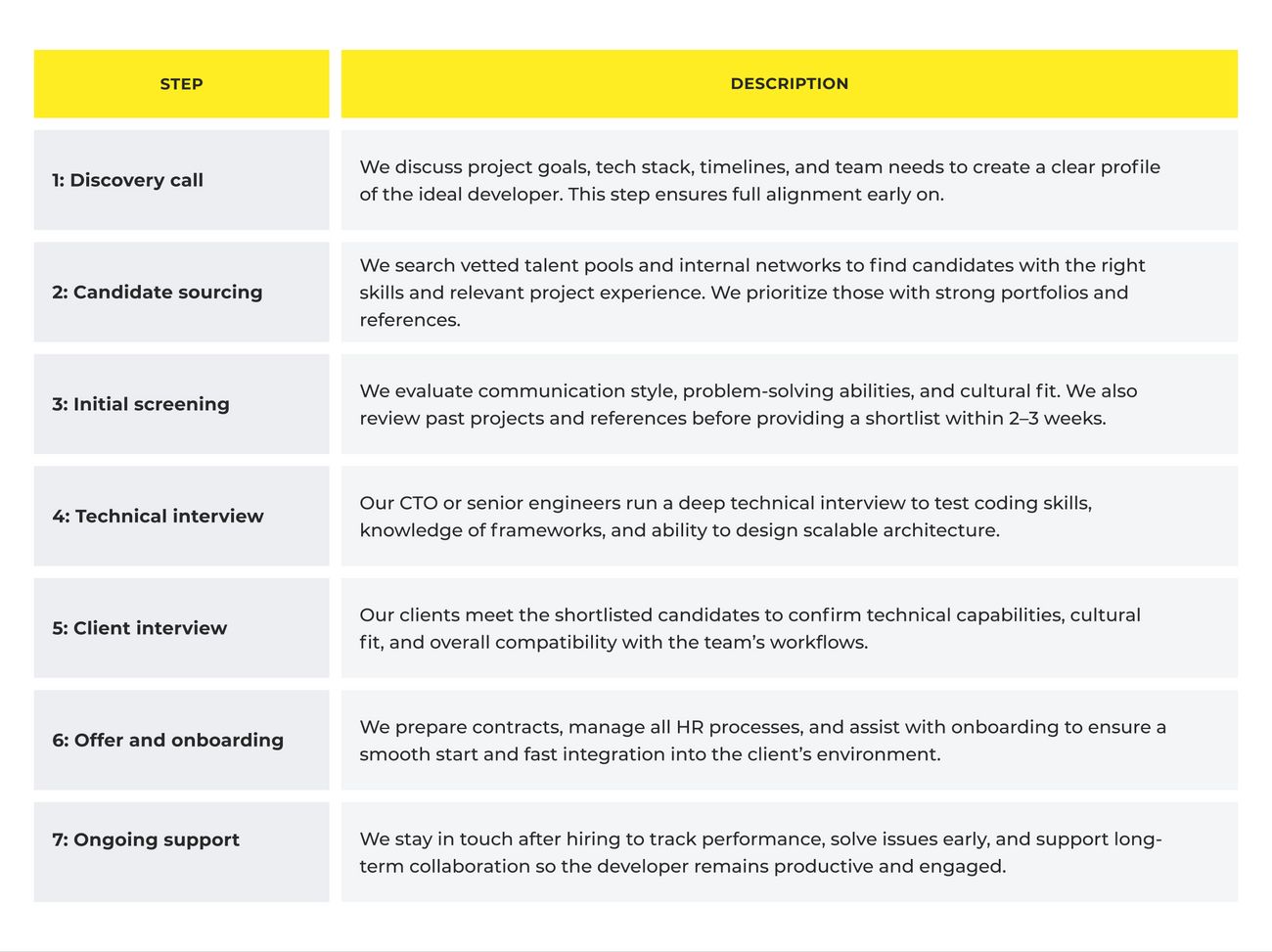
Why work with KPS?
Access to pre‑vetted talent with expertise in AI, machine learning, and data engineering.
Flexibility to scale up or down based on your project’s needs.
Reduced time‑to‑hire, letting you start projects faster without sacrificing quality.
Experience across industries, from retail and finance to healthcare and manufacturing.
With KPS as your partner, you don’t just fill roles — you build a team that can design, implement, and scale AI solutions that truly support your business goals. Whether you need short‑term expertise or a long‑term team, we provide the talent and support to make your projects succeed.
Will data scientists be replaced by AI?
Why are data scientists so important in implementing AI?
How can outsourcing help companies hire data science talent faster?
Can AI tools handle tasks like data visualization and predictive modeling without data scientists?
